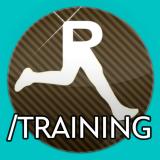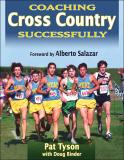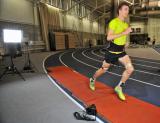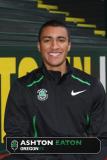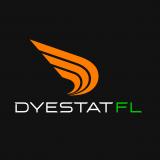Folders |
Performance Nutrition for XC Running by Lisa DorfmanPublished by
Lisa Dorfman, MS, RD, CSSD, LMHC The Running Nutritionist® DistancePreps.com
Performance Nutrition© for X-C Running
“Nutrition is the most crucial element for training hard because if it’s done right, the recovery from workout to workout is more complete, allowing us to get the most out of our bodies.”
Frankie Ruiz, Belen Jesuit Prep, Miami, Florida 6-time State Championship Team Head Coach
Running is a sport that clearly defines those who eat well and those who don’t. Compromising your training and competition diet can impact body composition, overall strength, endurance and health. At best, investing in your diet as much as your training can make you a champion at any distance. At worst, a poor fueling regimen can lead to overtraining syndrome—the inability to ever reach full running potential, and an intensified possibility of career ending injuries.
Preseason is the ideal time to build your food and fluid base. Take your gut for a test drive with new eating habits, adding healthy food groups such as veggies, fruits, whole grains and dairy; essential fats like those found in fish, nuts and soy & try pre and post workout bars, shake & electrolyte replacement sport drinks for recovery options. Getting this right during preseason guarantees that fine tuning, like improving racing strategies, is all that’s needed as the season progresses.
Growth + Training = Additional Calories
While training for cross country during the hottest season of the year is already a challenge, being a teenager adds a nutritional test in itself.
Did you know that the teenage years are the only time after birth that the velocity of growth actually increases? Teens gain about 20% of their adult height and 50% of their adult weight during this period? That during puberty, men gain about twice as much lean mass as women?
If you’re skipping meals and eating poorly, energy needs for growth and training are not met, and you are not getting a balance from all the food groups. If this happens, protein from muscle is rerouted to supply the brain and fuel your training, bone is no longer supported by enough muscle, the immune system is vulnerable, and your hair, skin, tendons and ligaments break down to the tune of chronic injuries, stress fractures and tears. All of this leads to illness, anemia and a dismal X-C season.
How much is enough?
How many calories does a teenage runner need? There’s no easy answer—just look at your teammates. Every runner and every teen hits puberty at a different time and grows at a different rate. According to the Institute of Medicine’s (IOM) Estimated Energy Requirements (EER), it can range from 2800 calories for the 12 year old middle school runner to above 3800 calories for the 18 year old senior runner and everything in between.
When is the best time to get the food and fluids in your body?
Practically and ideally, your calories should be consumed in 3 meals of 500-800 calories in the morning, noon and evening (at least 2 hours before bed to ensure a good night’s rest) and 3 snacks of 100-400 calories between those meals. For training, start with ½ of an energy bar and/or electrolyte sports beverage 45 minutes to 1 hour before the workout, and add another shake, bar or snack within 30 minutes after your workout is completed to ensure and accelerate the recovery process, help to prepare for a second workout or next day’s session.
Don’t forget the fluids. Work on getting a minimum of 2 to 3 liters or more of water or other beverages every day depending on your sweat rates and weather. You’re dehydrated or electrolyte depleted if:
Getting Started
While creating the best fueling program is not easy, it is a process for any runner at any age, and patience is key. As a sports nutritionist for close to 30 years, a former pro triathlete and competitive runner on the track through ultra-distance, I think that any place is a good place to start. According to Coach Ruiz, “I encourage the athletes to work together with their parents and pay attention to nutrition more than anything else. I encourage them to be as scientific as they like with their food intake.”
Remember, there is no perfect plan and there are no two runners who are alike. Your needs depend on your goals, your weak links, challenges, and duration and intensity of your training. Learning how to stay healthy while building the mileage, surviving the heat of the season and striving to run your personal best is ultimately the goal.
Eat Like a Kenyan or Ethiopian? Do you want to run like the world’s best? A recent 2012 study in the International Journal of Sports Physiology & Performance explored the diets of Kenyan & Ethiopian distance runners and found that diet plays a major role in their world class performances. Kenyan and Ethiopian distance runners consume a high carbohydrate, low fat, moderate protein diet, which is consistent with research-based recommendations for endurance-sport athletes. Their diet is primarily plant-based with an abundance of vegetables, fruit, and rice and includes a traditional maize (corn) dish called “ugali” (similar to American grits, except prepared thicker), served at mealtime with all types of meats & vegetables. East African distance runners also consume very little sugar with the exception of their energy drink called Chai tea which helps them to rehydrate immediately after training and at mealtime. Chai tea bags, which can be found at any grocery store blends black tea, known to be rich in antioxidant plant compounds, and spices. These spices have been found to have health benefits. To do this they add about 4 teaspoons of sugar, which replenishes muscle glycogen immediately after training. If you can’t eat quite like a Kenyan or Ethiopian yet, what should you eat? The Academy for Nutrition and Dietetics (AND) recommends growing athletes eat approximately 55-60% total calories from carbohydrates, 12-15% total calories from protein and 25-30% total calories from fat just to get started. To get adequate B vitamins, antioxidants & essential minerals like zinc & magnesium, make sure you eat your whole grains, fruits and veggies. To ensure good sources of calcium, potassium & sodium (the electrolytes which help to contract muscles and help to prevent cramps), drink milk or if you’re lactose intolerant find alternatives such as almond, rice or soy milk. To get the best fat sources of the essential Omega 3, find a fish you enjoy such as salmon or tuna. Also, include soy, almonds, walnuts or flax in snack foods, smoothies or baked goods for brain, joint & overall health, and try different pre/post workout snacks, recovery bars & shakes to make sure you have one that settles in the gut before and after training. Supplement or Not to Supplement
Without a doubt, the best way to get your daily dose of vitamins and minerals is through food.
Why?
Food works synergistically with vitamins and minerals, assisting with their absorption. If you don’t eat the food and get the energy from a whole foods diet that includes carbohydrates, protein and fat, it’s nearly impossible to use the vitamins and minerals from a supplement. Don’t waste your money just yet.
The exception might be an iron supplement, especially later in the season. Iron deficiency is common in runners as the season progresses since building and growing is accompanied by greater blood volume. Get tested for anemia before you start taking an iron supplement since more is not better when you are not depleted.
If you’re feeling a little low on energy and you have a history of anemia, try getting iron through food first. The best sources of iron are those from animal products like meat, and also through fortified cereals, beans and grains. Foods and beverages rich in Vitamin C, like orange juice, help with the absorption of iron while calcium-rich foods, like Milk, interfere with complete absorption.
If you’re determined to get a supplement anyway because you’re getting enough calories, working on better eating habits and food choices, but are not quite at the super eater level yet, then a multivitamin might be for you. For the safest, certified and “clean” supplements, go to www.ConsumerLabs.com for a list of acceptable choices.
One step at a time
It’s challenging for anyone, let alone a teenage runner to change everything about their diet all at once. The easiest solution is to find a few areas here and there to improve your diet. The best place to start is just to get started like you did with running. Step by step.
It’s not an easy process, but neither is striving to be your personal best. And from one runner to another, there will always be that next goal, faster PR, and ultimately the championship, whether state, national or world.
Let nutrition play a part in contributing to your championship running, your personal best in health, sport and life.
************************************************** Lisa Dorfman, MS, RD, CSSD, LMHC, known nationally as “The Running Nutritionist®”, Lisa is Director of the Graduate program in Nutrition in the Department of Kinesiology & Sports Sciences at The University of Miami, was Director of Sports Medicine Nutrition & Performance, sports nutritionist to “The Canes” UM athletic department” 2003-2011, & personal nutritionist to Olympian , Elite & Professional athletes worldwide. A former pro triathlete & competitor in over 34 marathons (PR 2:52:32), Ironman USA, & hundreds of road (5K PR 17:23, 10K 37:27) & multisport races including the 2004 Long Distance Duathlon World Championships for Team USA, Lisa has been featured on Dateline, 20/20, CNN, ESPN, Fox, MSNBC, Designing Spaces, E & local & international news & appears in dozens of publications monthly as a health expert. Lisa’s programs & 5 books including her latest Performance Nutrition for Tackling Stress (Momentum Media, 2013) is available worldwide at www.AntiStressDiet.com. For more info about Lisa and her services go to: www.Foodfitness.com , www.HealthyMiami.com . Follow/Like Lisa on: twitter@HealthyMiami twitter@AntiStressDiet http://www.facebook.com/antistressdiet More news
|
